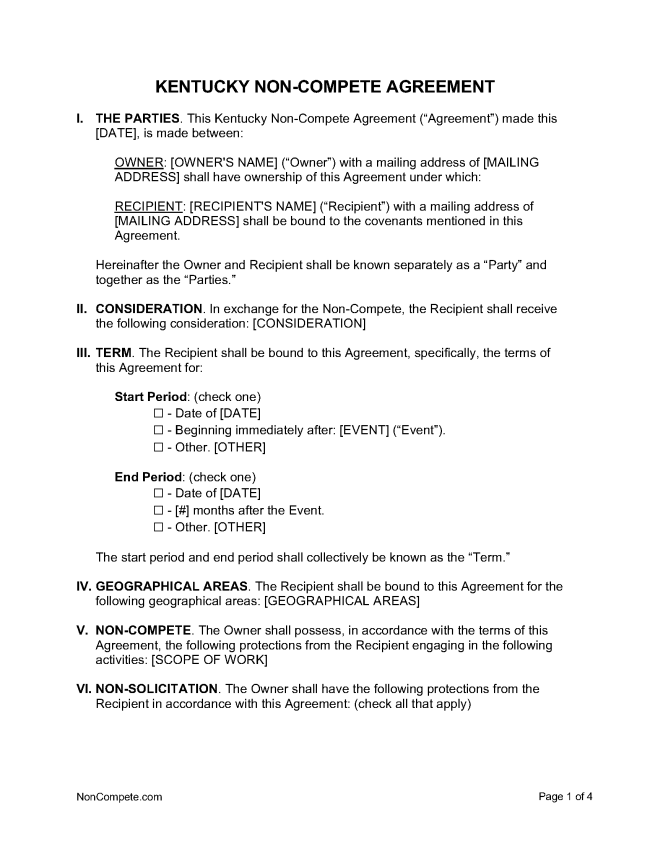A Kentucky non-compete agreement is a set of provisions in a contract that limits what work a party may pursue in the future. Unlike some states, Kentucky non-compete agreements may apply to both employees and independent contractors. Compared to some other states, Kentucky also has relatively generous standards in deciding whether to enforce non-compete agreements.
Table of Contents |
Are Non-Competes Enforceable in Kentucky?
Yes. Courts will generally enforce valid, reasonable non-compete agreements to prevent former employees from violating them. (Louisville Cycle & Supply Co., Inc. v. Baach (1976)).
Reasonableness
Courts determine whether a non-compete agreement is reasonable by considering the nature of the business, and the scope of the restrictions, including:
- What the agreement prohibits,
- How long the agreement is in effect, and
- The territory over which the agreement applies.
Independent Contractors
Non-compete agreements can apply to independent contractors, even if the business that the contractor signed with is later sold to another party. (Kegel v. Tillotson (2008))
Protectable Interest
Business interests that may be protected through a non-compete agreement include:
- Preventing competitors from hiring former employees (Higdon Food Service, Inc. v. Walker (1982))
- Protection of specialized training or knowledge (Central Adjustment Bureau, Inc. v. Ingram Associates, Inc. (1981))
- Good will of a business, including reputation and client relationships (Crowell v. Woodruff (1952))
Sale of Business vs. Employment Contract
The framework for deciding whether a non-compete agreement is enforceable is the same whether found in an employment contract or a contract for the sale of a business. Still, reasonableness is judged differently by different standards. Crowell v. Woodruff (1952).
Kentucky courts have never explicitly stated that there is a more forgiving definition of reasonableness in non-compete agreements related to selling a business. They have generally been more permissive in the agreements they agree to enforce. See the “Maximum Term” section for more information.
Prohibited Professions
Non-compete agreements in employment contracts or partnership agreements that restrict how attorneys can practice in the future are not enforceable, except for certain agreements concerning retirement benefits. Rule SCR 3.130(5.6)(a).
Attorneys cannot enter case settlement agreements that limit their right to represent clients. Rule SCR 3.130(5.6)(b).
Terminating an Employee
It is not certain whether terminating an employee will make a non-compete agreement unenforceable. Hammons v. Big Sandy Claims Service, Inc. (1978) suggested that non-compete agreements require the employer to act in good faith if an employee is terminated, but the case involved an employee who left voluntarily.
Burden of Proof
The party opposing enforcement of the non-compete agreement has the burden of proving that the contract was invalid. Crowell v. Woodruff (1952)
Continued Employment (consideration)
Continued employment is likely adequate consideration to support a non-compete agreement. In Higdon Food Service, Inc. v. Walker (1982), the Kentucky Supreme Court held that a non-compete agreement involving a sales employee was enforceable, even though the job was at will, meaning either party could have ended it at any time.
However, the consideration may not be sufficient if the employee is quickly terminated. In Higdon, the employee had worked at the firm for more than two years after signing the agreement. In Crowell v. Woodruff (1952), the state Supreme Court declined to enforce a non-compete agreement when the employee was let go after only four months.
Maximum Term
Neither the Kentucky legislature nor the courts have set a maximum term for non-compete agreements. Instead, the amount of time a non-compete provision is permitted to be in effect will depend on the circumstances of the case.
- In an employment contract, a two-year restriction covering the entire United States was valid and enforceable by a collection agency because ample competition in the industry meant public interest was not harmed by enforcing it. (Central Adjustment Bureau, Inc. v. Ingram Associates, Inc. (1981)).
- In a contract for the sale of a produce-selling business, a restriction preventing the seller from operating a similar business in the same county for the entirety of the buyer’s 10-year lease was enforceable. (Ceresia v. Mitchell (1952)).
Blue Penciling (allowed)
If a portion of a non-compete agreement is unreasonable, a court should alter the provision to make the agreement enforceable. (Ceresia v. Mitchell (1952)).
